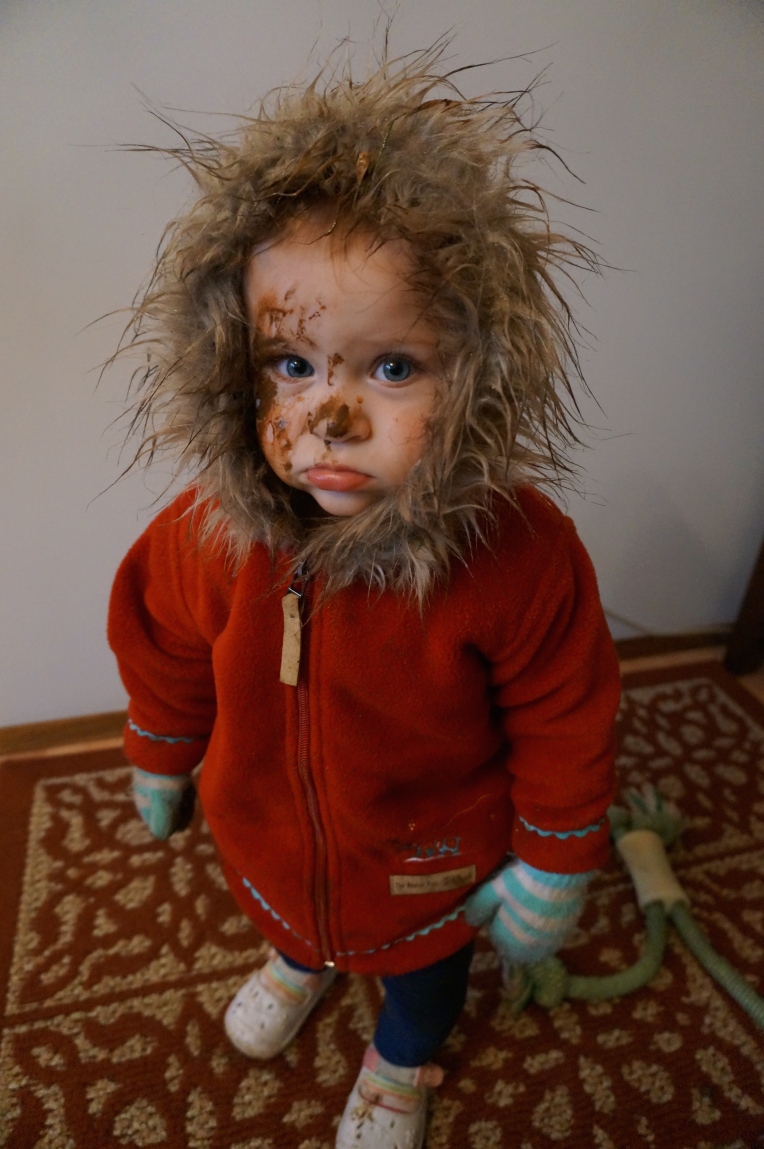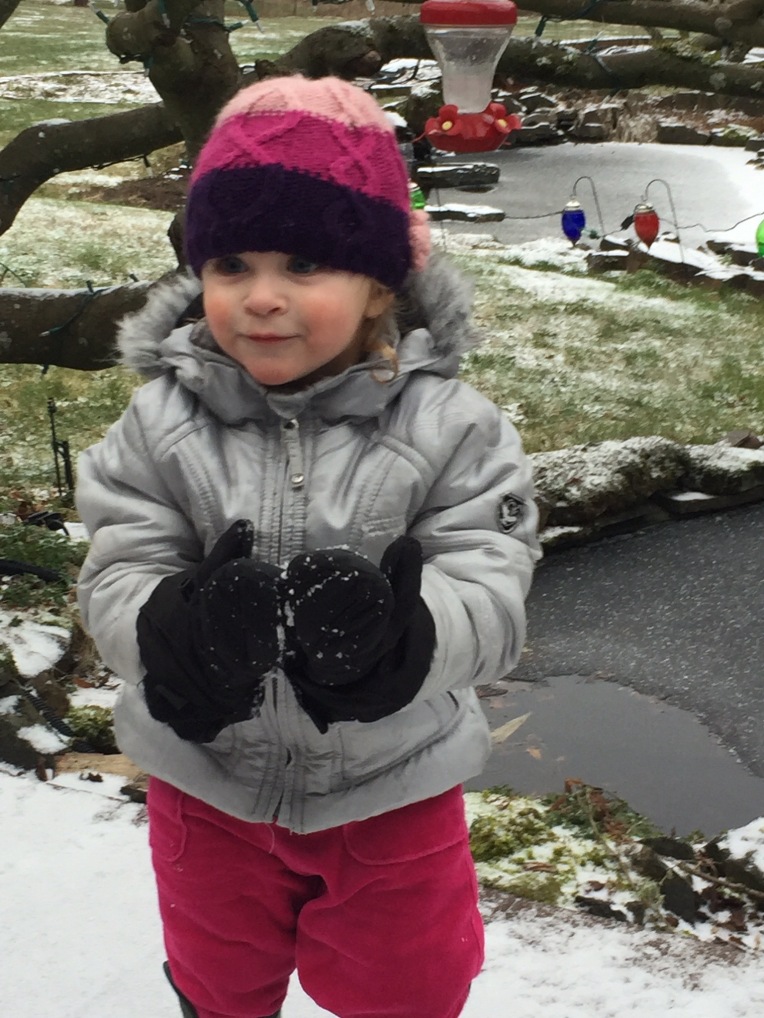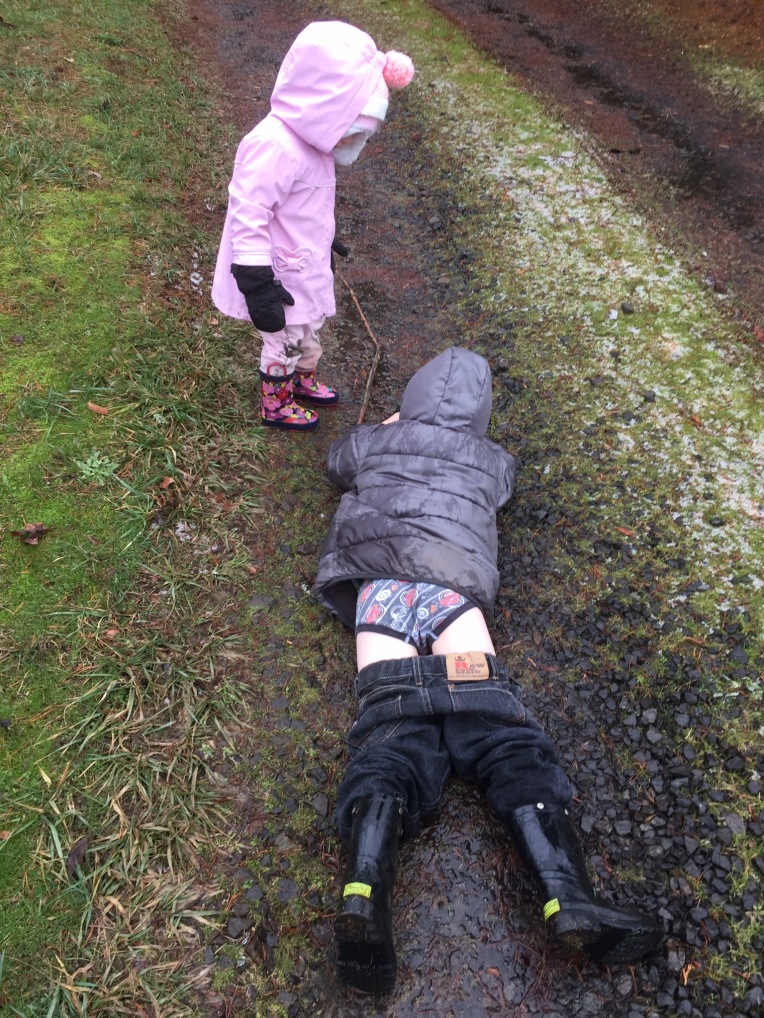I’m not a perfect parent; really no one is, but I particularly am not. How do I know that? I’ll give you the first two reasons that come to mind:
- When a child (especially the oldest, age five) encounters a natural consequence of poor choices, I am filled with a deep, bubbling glee. Sometimes I manage to refrain from laughing. Sometimes I don’t. Always, I make a point of quickly detailing the cause and effect involved in the situation. I’m pretty sure a perfect parent, or even a really good one, would respond with sympathy and compassion in the discussion of the action and consequence. I don’t manage this.
- When a child finds themself* in an uncomfortable circumstance, my first response is not rescue or assistance. My response is to pull out the phone for a picture. Only after it has been duly recorded do I smother my giggles and help them.

Photo first. Rescue later.
This week, my son has been particularly difficult. I could count on one hand the number of times he’s obeyed immediately this week. Dawdling, forgetting what he’s been told, not hearing what he’s been told, outright disobeying… as many parents can attest, this gets exhausting. Time outs, scoldings, loss of privileges, loss of possessions, vigorous expression of irritation (yes, I’ve been guilty of yelling) — all to no avail. He’s continued to drift through life completely unaware of the instructions of his parents.
That’s why this imperfection of mine has come up, twice in the last two days. Twice now, Niko has been brought up short by an immediate and uncomfortable consequence to his actions. And my glee has overwhelmed me.
We have a creek, a drainage ditch really, running across one end of our property. In summer it’s dry, but in winter it’s full and overflowing from the rainfall. Niko knows he’s not allowed in it. Even with not much water in it, it’s deeper than his boots. With the recent heavy rains, it could actually be dangerous, with its swift flow combined with the slippery rocks on the bottom. So I’ve explicitly told him, of course, not to go in. Multiple times.
Yesterday we had snow. Just a bit, but enough to make the kids enthusiastic about going outside. After approximately thirty minutes’ worth of donning warm clothes, we went down the hill toward the creek, where it’s open and has plenty of space for running. Niko made a beeline for the creek. “Stay out of the creek,” I called, as he raced toward it. “Don’t go into the creek,” I repeated as he continued. I was answered by a liquid plop. He had jumped in.
As I hauled him out, his boots full and his pants soaked to the thighs with icy water, I couldn’t resist pointing out the obvious. “Didn’t I tell you to stay out of the creek?”
“Yes.”
“And now you have to go inside while Sofie plays.”
“Whyyyyyyyyyyyy?”
“Because you’re soaking wet and your boots are filled with water.”
Wailing with sorrow, he trudged inside with Aaron, while Sofie and I played in the snow for another ten minutes or so. Sadly, I failed to get a photo. All I got was one of Sofie, preparing to throw a handful of snow at the house, an activity made more thrilling by her conviction that she was getting away with something.

However, this was not the most satisfying such event of the past two days. That honor falls to today’s dramatic demonstration of natural consequences. You see, I’ve been working on a new skill with Niko, one that he really should have learned by now, but which he’s been resisting on the grounds that it’s much too hard to do. What is this terribly difficult skill? Snapping his own pants. Yes, I have been asking my five-year-old to learn to fasten his own pants when getting dressed — a tyrannical demand, to be sure, but what can I say?
Efforts to teach him to snap his pants have been marked with considerable frustration from both of us. He gets floppy-arm syndrome, moaning “I can’t! It’s too hard!” while pawing ineffectually at his waistband. Neither of us have enjoyed these training sessions, but I’ve continued to nag him. “Snap your pants, please!”
Today Niko and Sofia accompanied me down our driveway and to the end of the lane to haul out the trash. They puddle-hopped their way down the road, helped me investigate the mailbox, then splashed back up. Midway up our driveway, as I urged Niko to hurry UP, because I needed him through the gate so I could close it, he obediently broke into a halfhearted jog. As he jogged, his waistband began to slip. “Wait –” I called, but I was too late. The pants plunged to his knees, and he sprawled flat on the muddy gravel.
I was immobilized with mirth. I feel a little bad for this, but I truly could not move, I was trying so hard to keep my laughter from bursting out. He also couldn’t move, bound at the knees as he was by those pants. I finally got myself under control enough to capture a couple of photos, then extended my hand to help him up.
“This is why you should snap your pants,” I pointed out. “Haven’t I been telling you to snap your pants?” Dripping with muddy water, cold and exposed, he nodded reluctantly. “Well,” I told him sternly, “this is why. If you’d snapped your pants, this wouldn’t have happened.” The sternness was spoiled just a little by a snicker I couldn’t restrain. I mean, honestly, it was pretty funny. As you can see:

So, there you have it. I’m not a perfect parent. I rejoice when natural consequences remove the necessity of scolding and imposing my own mean-mom consequences. I laugh when my kids find themselves in pickles. And I take photos when I should be helping.
And then I post those photos on a public blog.
*The Washington Post‘s Bill Walsh recently wrote a piece, filed in Opinions, regarding this year’s language adaptations. One of them was the surrender to the inevitability of the use of “they” as a singular pronoun. That is to say, when a writer needs to refer to an individual, unknown or unidentified, who may be male or female, the WP is now accepting “they” to fill this need. For example, “If a student talks during a test, they will be given a zero.” As Mr. Walsh pointed out, this is a far from new development; it’s been used, he says, by Shakespeare, Jane Austen, and the translators of the Bible, to name just a few cases. And it has a precedent: the word “you” was once solely plural, the singular pronouns being “thee” and “thou.” We’ve long since accepted “you” as a singular pronoun. Now that the WP accepts “they” likewise as a singular, I feel perfectly comfortable using it in my own writing. So there.**
**Yes, this addendum was mainly for my mother. You’re welcome.

Back to the actual topic of this blog… Remind me to tell you the cautionary tale of Ben and the Hay Bale.
LikeLike
Tell! Tell!
LikeLike
The annoying thing about this is that there is already an efficient and well-established way to work around the problem of referring to an individual of undetermined or irrelevant gender — “he.” The problem is that this has mysteriously become politically incorrect.I believe that some feminists took the use of the masculine pronoun to be evidence of gender bias. If that were the case, I’d wholeheartedly support its elimination, but it never was bias, just convenience.
LikeLike
I don’t know why it’s convenient to use the male pronoun to refer to everyone regardless of gender. I actually do see it as evidence of systemic male bias. When this mode of reference was established, writers generally were male and assumed males would be reading their work. That assumption is clear throughout literature and science. My favorite example of this bias is Sigmund Freud saying, “We shall never truly understand women.” Excuse me? “We” are over 50% female! Obviously he was addressing a world in which anyone important was male.
The thing with bias is that it’s rarely deliberate. Bias is having band-AIDS and nylons in “flesh” colors that only work for white people, and few brands offering darker alternatives. Or “feminine” versions of basic items like T-shirts or razors, essentially identical apart from color or script style or size, being an average of 15% more expensive. There’s no CEO or marketing guru at the top plotting how to oppress minorities and women. It’s just that the people in charge are 90% white males, and they tend not to do a good job thinking from the perspective of others.
I think it’s absurd to refer to unknown individuals who have a 52% chance of being female, as “he.” It’s just silly.
LikeLike
I think it’s vaguely risible to refer to an unknown individual as plural, as if we expect him to be schizophrenic. At least the use of the masculine pronoun ensures that we’ll be right at least 48% of the time. I don’t know the demographics of schizophrenia, but I’ll bet the percentage is considerably lower.
LikeLike
Exactly the same argument could be used against the use of “you” – but we’ve been using it so long we’ve forgotten its origin as a solely plural form.
LikeLike
Perhaps we should start a movement propounding the use of the feminine pronoun, since a there’s a higher possibility that it would be accurate.
LikeLike
Very logical! Though that is true only for adults past the age of 25 or so. There are more baby boys than girls, by about the same percentage and the reverse in adults. In any case, it would be just as sensible (perhaps slightly more so) to use the feminine pronouns rather than male!
LikeLike
lol … my mother would completely agree with yours!
LikeLiked by 1 person
I agree with my mother (and likely yours) that the Washington Post is far from the last word in grammatical correctness. I’m sure we’d all be more swayed by an authority such as the APA (American Psychiatric Association) Style Guide, which tends to be the authority in scientific and other non-fiction writing, or the MLA (Modern Language Association), or European equivalents. Still, I do think a major media source’s adaptation is significant, and I strongly suspect others will follow.
LikeLike
I had no idea that APA was American Psychiatric Association! I’ve always assumed it was some group like MLA, specialists in language…
LikeLike
I’ve never been sure why they’re considered such an authority, but one way or another the world of scientific writing does APA. I don’t like it all that much. MLA feels more intuitive to me. When I edit Aaron’s papers, I ignore the citations, but every now and then I come across a grammatical issue that I have to look up, because MLA and APA handle punctuation differently. APA generally uses less punctuation: “all encompassing” vs. “all-encompassing”, for example.
LikeLike
Fine. I’m not convinced that the Washington Post is the ultimate authority, any more than I buy the argument for eliminating the double space at the end of a sentence because “typesetters agree.”
LikeLiked by 1 person
But in this case the logic and precedent is sound.
LikeLike
As for the typesetter argument, it sort of makes sense to me. The original two spaces was a result of typesetters’ choices, after all, and wasn’t consistent across the English-speaking world. Now that printing doesn’t use type blocks, the double space isn’t necessary– though I personally think it looks nicer. It’s a built-in function in many smart phones and tablets — a double space converts automatically to a period and a space — which paradoxically has the twofold effect of users’ continuing the habit of double spacing, while the text itself has a single space between sentences. I honestly don’t have much of an opinion about it. My Word program doesn’t see either as incorrect, and I’ve fallen into the habit of just one space because it seems to be the new norm, but if someone requested that I use two spaces I wouldn’t object.
LikeLike